Yayasan Pesisir Lestari (YPL), in partnership with Blue Ventures (BV), has been supporting Yayasan Mitra Insani (YMI) to train the communities of Sapat Village and Perigi Raja Village in mud crab fisheries monitoring since December 2021.
Sapat is a village located on the east coast of Sumatra in Indonesia. In the past, the people of Sapat were generally coconut farmers, and fishing was more of a side activity. However, in the last twenty years, increased environmental damage and tidal floods have damaged the coconut plantations. As a result, many people in Sapat turned to fishing as their primary source of income. The community has been crab fishing for generations, the skills and knowledge passed down by families and other fishers.
The community in neighbouring village Perigi Raja catch shrimp, fish and mud crabs. The people of Perigi Raja have been fishers for a long time, with the skills being passed on by the sea people (Duano tribe) in the village, who in turn pass it down from parent to child.
The fishers in Sapat Village and Perigi Raja Village catch mud crabs using traditional fishing gear such as metal spears or traps called pento.
Over recent years, the fishers noticed a decline in the mud crab population which they have come to rely on for their income. By participating in the mud crab fisheries monitoring programme, the communities hope to find out why numbers are declining and what they can do to revive the mud crab population.
Ten male and female community members have been trained to collect data on mud crab fisheries using a mobile monitoring system called KOBO to understand the state of the mud crab population in their area. The data collected are catch and biology data, which includes mud crab sex, weight, carapace (the crab’s ‘shield’) width, and species name. They also collect price data to calculate the income. Mud crab is one of the main livelihoods of the Sapat community.
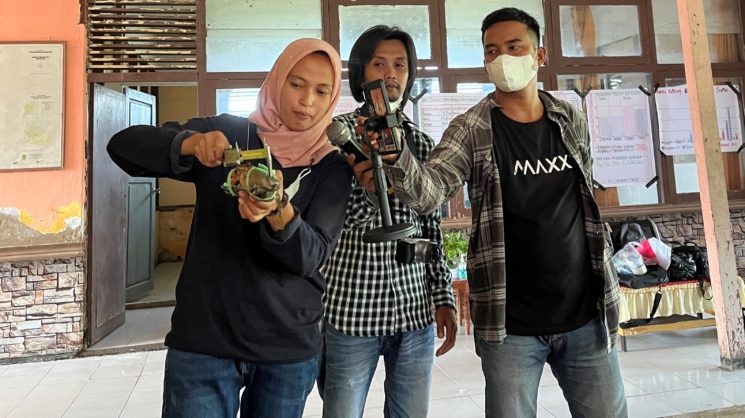
Community members of Sapat and Perigi Raja villages in Indonesia receive training in collecting mud crab data. Here, measuring the carapace of the individual mud crab is demonstrated during data feedback session. Photo credit: Indah Rufiati.
The data collected by the community is collated, analysed, and fed back to the community regularly. This is done during data feedback sessions. Members of the community and other people or groups who are impacted by the state of the fisheries, discuss the fisheries’ condition using the data, combining it with local knowledge. They also discuss other related issues, including the importance of fishing sustainability.
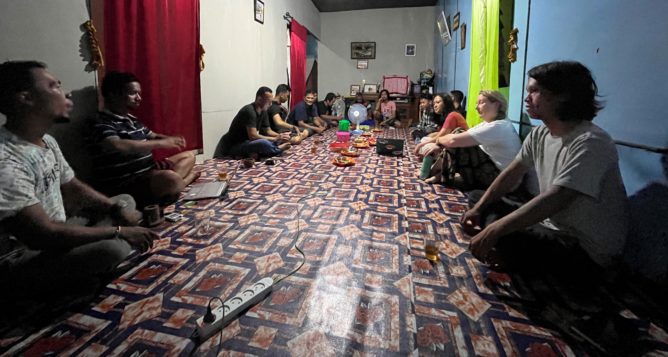
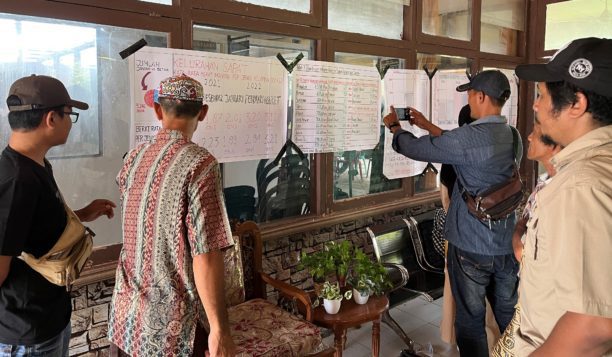
Data feedback sessions with the data collectors and other community members to discuss what the data means to the mud crab fisheries and how they can tackle problems such as overfishing. Photo credit: Indah Rufiati.
“Because of the data collection, the community is aware of the large number and potential of fishery resources. They realised it was important to manage their fishery so they could use it for generations. Besides implementing closures, the community also started releasing small mud crabs back into the fishing ground so that they would grow bigger. Until now, more than 3,000 small mud crabs have been released back into the fishing ground.
Fisheries management and conservation methods involving local communities can also guarantee the future of food security.”
– Rukim – Fisheries Officer, Yayasan Mitra Insani
The process assures close involvement with the communities, allowing them to take active roles in management and giving them a strong sense of ownership. After two data feedback sessions, one year later, the community of Sapat decided to trial a temporary fishery closure in part of the fishing ground from 22 September to 27 December 2022. The location selected for the fishery closure is a location with high mud crab catch.
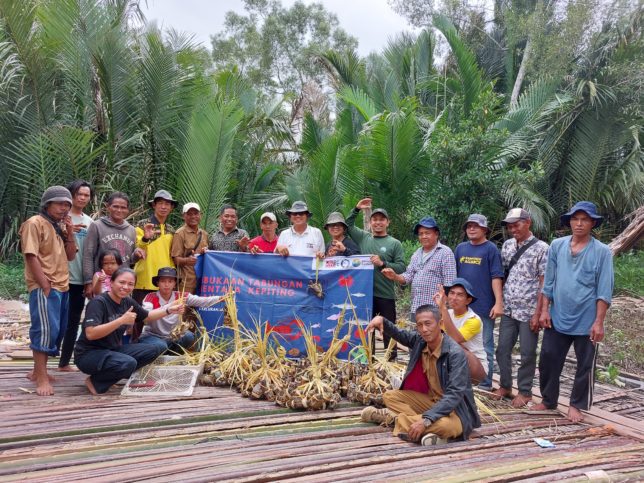
Participants of the mud crab project in Sapat on the day of the temporary closure re-opening, with their catch. Indonesia. Photo credit: Yayasan Mitra Insani.
Temporary fishery closures (also often referred to as rotational, seasonal, periodically harvested, or non-permanent closures) are bans on mud crab fishing in a specific area or fishing site for a set period of time. The mud crab is a fast-growing species if given enough time and space. It means that they can be fished sustainably using only fairly short fishery closures, which makes it quite a reliable source of income for the fishers.
“Before carrying out the ‘mud crab saving’ (temporary closure), we used to sell all the crabs we caught regardless of their small size. But now, crabs smaller than 1 ounce are released back in the closure area with the hope that they will grow bigger and we will get bigger mud crabs during the opening. We also feel the benefits of saving crabs. This can be harvested when prices are high, with larger sizes and more crabs than before the closure was carried out.
The benefits of temporary closure are not only for mangrove crabs but also for shrimp; this can be seen from the increasing number of fishers outside the village who fish outside the closure area.
During the first day of the closure opening, we caught 100 kg of mud crab, mostly with size B (250 grams – 350 grams per individual mud crab). We also want to implement another closure on a different fishing ground because we think this is an excellent way to have mud crab ‘saving’.”
– Sahran, mud crab fisher
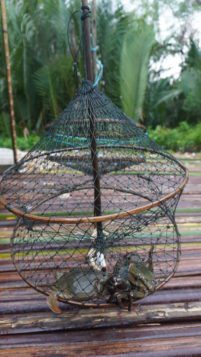
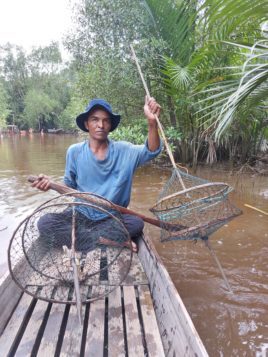
Traditional method of catching mud crab. Photo credit: Yayasan Mitra Insani.
The temporary closures are a great hands-on experience for communities to learn how to implement fisheries management measures. When communities see that temporary fishery closures work, it can build local support and confidence to carry out more fisheries management and conservation measures, including permanent no-take zones.
This work is funded by UK AID in collaboration with Blue Ventures.
Read more about mud crab monitoring in Indonesia in Indah’s previous blog: Participatory mud crab monitoring paves way to sustainable mangrove management.

